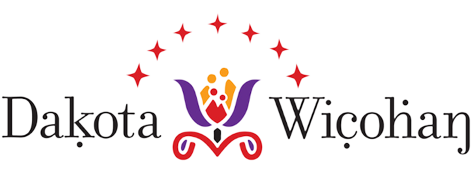
Resources
Click on the links below to practice speaking Dakota Iapi, our beautiful Dakota language!
Other Language Resources
- Dakota Language is taught in several other colleges and schools around the state, including Minneapolis Community & Technical College (MCTC), Metropolitan State University, and Concordia Language Village.
- Many communities sponsor Dakota language tables around the Twin Cities, including: Little Earth, Mendota, and the Minneapolis American Indian Center.
Educational Resources for Your School or Community
Documentary: To order a copy of Dakota Iapi Teunhindapi, a 55-minute film on the story of the Dakota language in Minnesota, please click here.
Handbook: Dakota Wicohan offers a four-color 24-page companion handbook to the Dakota Iapi Teunhindapi documentary. This user-friendly mini-book includes additional history, story, and reflective questions to inspire dialogue. To order copies, please click here.
Curriculum: Dakota Wicohan develops curriculum for Dakota learners and for students in Minnesota schools, including:
- Mni Sóta Maḳoce: The Dakota Homelands
In this new curriculum, Minnesota 6th graders gain an appreciation of the significant Dakota relationship to Mni Sóta Maḳoce. Through this lens, students will examine a new way of thinking about our relationship to the land and our shared history in this place. This 10-lesson unit has been made available to Minnesota schools through teacher trainings around the state. Learn more. - Dakota Itancanpi Kte Unkihduwiyayapi: We prepare ourselves to lead with wo’Dakota
This new curriculum invites Dakota community embers of all ages on a journey to explore and prepare ourselves to live and lead according to the Dakota way of life in the twenty-first century.
Note: Dakota Itaƞcaƞpi Kte Uƞkihduwiyayapi is not yet available for public distribution, but please check back soon!

Professional Development, Community Workshops and Documentary Screenings
Dakota Wicohan offers a wide variety of workshops for educators, schools, and community groups featuring, Dakota Iapi Teunhindapi: We Cherish the Dakota Language, our original documentary on the story of the Dakota language in Minnesota.
* Documentary Screenings: Dakota Wicohan is happy to screen Dakota Iapi Teunhindapi:
We Cherish the Dakota Language, the hour-long documentary on the history of the Dakota language revitalization movement in Minnesota we produced in 2013. This original film, based on interviews with Dakota elders, provides a powerful introduction to Dakota culture, history, and language and has proven effective for learners in diverse community settings. We also offer a 24-page, 4-color companion handbook which provides critical background content and resources for further inquiry.
* Introductory Documentary Screening & Workshop
Dakota Wicohan will provide a brief introduction to the film, screen the documentary, and host a brief question-and-answer period.
* Professional Development Workshop for Teachers, Schools, and Community Groups
Dakota Wicohan will screen the documentary for your group and hold a facilitated dialogue that will include questions specifically tailored to your group’s interests and needs. In addition, all participants will receive a copy of the companion handbook along with suggestions for how to use the materials in your school, community, or organization.
* Customized Professional Development Workshop
Dakota Wicohan is happy to work with you and your community or school to develop a customized training that addresses the specific needs of your staff and learners.
FFI: For more info on customizing your professional development workshop or documentary screening, please call Doris Stands, Dakota Wicohan: 507.697.6272 or via email: dakotawicohan@gmail.com. Sliding scale prices are available for communities without professional development funds. Pidamaya!
The Wicozani Instrument
The Wicozani Instrument is grounded in Indigenous paradigms emphasizing relationality and interconnectedness of mental, physical, and spiritual health. While there is diversity among Native communities, the Instrument may appeal to many Native communities because health is defined from an Indigenous perspective. The Wicozani Instrument is a 9-item measure that is accessible to youth and adults.
The Wicozani Instrument:
- places power in the hands of the individual;
- values the individual’s ways of knowing;
- views the individual’s perspective as valid;
- changes the deficit-based narrative around Native health;
- provides individuals with the opportunity to:
- create their own definitions and factors of health;
- identify where they are at on their continuum of health;
- take ownership over their health;
- see themselves as healthy; and
- build on existing areas of healthy behavior.


